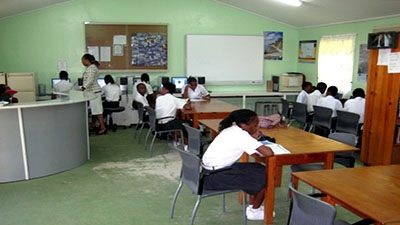The educational system in Saint Vincent and the Grenadines follows a British-based structure, offering free and compulsory education at the primary and secondary levels. It is overseen by the Ministry of Education and National Reconciliation. Here’s a detailed breakdown of the education system and teaching methods used:
Structure of the Education System
1. Pre-Primary Education (Ages 3–5)
- Offered through preschools and daycares.
- Focuses on early childhood development: play-based learning, motor skills, socialization, and basic literacy.
2. Primary Education (Ages 5–11)
- Duration: 7 years (Grades K–6)
- Compulsory and free in public schools.
- Subjects taught: English, Math, Social Studies, Science, Health, ICT, Civics, and Religious Education.
- Ends with the Caribbean Primary Exit Assessment (CPEA) to place students in secondary schools.
3. Secondary Education (Ages 11–17)
- Duration: 5–7 years
- Divided into:
- Junior Secondary (Forms 1–3)
- Senior Secondary (Forms 4–5)
- Students prepare for:
- Caribbean Secondary Education Certificate (CSEC) exams (administered by CXC).
- Students who perform well can continue to 6th Form or Community College.
4. Tertiary Education
- Provided mainly by:
- St. Vincent and the Grenadines Community College (SVGCC) – Offers A-levels, CAPE, associate degrees, vocational programs.
- University of the West Indies (Open Campus) – Offers distance and in-person degrees.
- Some students study abroad in Cuba, UK, US, and CARICOM states through scholarships.
5. Technical & Vocational Education (TVET)
- Integrated into secondary and post-secondary education.
- Offered through:
- Technical Institutes
- National Qualifications Framework (NQF)
- Prepares students for careers in construction, agriculture, hospitality, and ICT.
Teaching Methods Used
Traditional Methods
- Teacher-centered instruction is still dominant in many schools.
- Emphasis on:
- Lecture-based delivery
- Chalk-and-talk
- Rote memorization and repetition
Modern / Student-Centered Approaches
- Increasing use of:
- Group work & discussions
- Project-based learning
- Hands-on science experiments
- ICT integration in classrooms
- Assessment for learning (formative feedback)
Digital and Online Learning
- Expanded during COVID-19 and remains in use.
- Platforms: Google Classroom, Zoom, and regional e-learning resources.
- Ongoing effort to integrate laptops and tablets in teaching.
Assessment Methods
- Continuous assessment through:
- Homework
- Tests and quizzes
- Group presentations
- National exams (CPEA, CSEC, CAPE)
Languages of Instruction
- English is the official language and primary medium of instruction.
- Vincentian Creole (local dialect) is often spoken informally.


